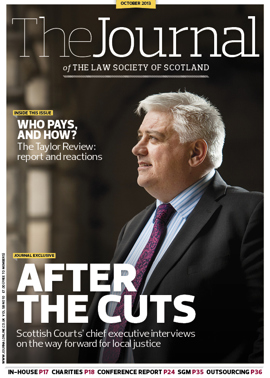It's the name of the game

Q: I saw last month’s column which looked at what solicitors can properly call themselves. I am a first year trainee solicitor: are there any restrictions on what I can have on my business card or how I should be signing letters?
A: As a first year trainee you cannot be called “solicitor” and must be designated as a “trainee solicitor”. In relation to business cards or letters you should be signing as a trainee solicitor. To sign as a solicitor would risk you being accused of holding yourself out as a solicitor, which is an offence. On becoming a second year trainee, it is possible to apply for admission as a solicitor and be issued with a practising certificate. At that stage, it is permissible to sign documentation that requires signature by a solicitor. However, you should be aware that there is a restriction on practising certificates issued to trainee solicitors which prohibits the signature of certificates forming part of a power of attorney document. In terms of your business card, it will be necessary for it to state “trainee solicitor” if your employers are in private practice, because the status and designation of employees must be unambiguously stated on the firm’s professional stationery.
Q: I am a newly qualified solicitor and unsure as to whether I am eligible to become a notary public and how to go about this?
A: The Society can help with this, and further guidance is on the website in Division E of the Rules & Guidance section, headed “Guidance re Acting as Notary Public”. Responsibility for the admission and registration of notaries lies with the Council of the Society. Petitions to the Court of Session for admission as a solicitor also include an application for admission as notary public, so you should check what happened when you were admitted. Only solicitors holding a current practising certificate issued by the Society have the right to act as a notary. Accordingly, you are eligible to become and act as a notary. In the event that a solicitor no longer has a practising certificate, they will be removed from the register of notaries and cannot notarise documents. Finally, certain documents may require to be used abroad and require to be “legalised” (authenticated by the Foreign & Commonwealth Office (FCO) in London). In order to effect this, notaries should register their signature and seal with the FCO.
In this issue
- Cold case examination of early childhood evidence
- Incentivising employee ownership
- The diversity imperative
- Towards a more inclusive democracy
- Journal magazine Index 2013
- Reading for pleasure
- Opinion: Campbell Read
- Book reviews
- Profile
- President's column
- RoS's services for solicitors
- Issues for the Union
- Critical mass
- Is this where it ends?
- Testing capacity
- Making plans for auto-enrolment
- Loosening the purse strings
- Data: don't be caught out
- Punished enough?
- Prior statements practice
- Family business musings
- TUPE: armour not gold-plated?
- Pension policy - a vote winner?
- Scottish Solicitors' Discipline Tribunal
- In with the system
- Check and double-check
- Lender Exchange ahead
- Have you the capital?
- How not to win business: a guide for professionals
- Reflections from the Complaints Commission
- Ask Ash
- Danger spots
- It's the name of the game
- Law reform roundup
- Conference aspires to judicial diversity






